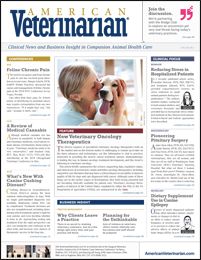Addressing an Animal Welfare Crisis
Oftentimes, many pet owners struggle to with having limited funds for veterinary care, yet organizations such as the Access to Veterinary Care Coalition are committed to giving the care that low-income households and their pets deserve.

According to the results of a national population survey conducted by the Access to Veterinary Care Coalition (AVCC), a group of for-profit and nonprofit veterinary service providers, animal welfare organizations, and social service professionals, nearly 28% of US households have experienced barriers to veterinary care in the past 2 years. The overwhelming obstacle for pet owners is financial.
The data gathered from the survey, which was conducted in collaboration with the University of Tennessee Knoxville College of Social Work and completed by 5652 respondents, are intended to serve as a guide for veterinarians, animal welfare organizations, legislators, community leaders, and other stakeholders as they seek to improve access to veterinary care. According to the survey report,1 an estimated 29 million dogs and cats live in families that participate in the Supplemental Nutrition Assistance Program, also known as food stamps. However, a significant segment of the middle class also struggles with having limited funds for veterinary care, especially when the need involves high-cost care.
The report points out that in many instance people will go without food and medicine for themselves to make sure their pet has what it needs. Furthermore, in addition to supporting mental, physical, and emotional health, pets provide their owners with unconditional love and a connection to the community.
“The paradox we face is that while it may be logical that someone should not have a pet if they cannot provide veterinary care, it is difficult to defend denying companionship with pets,” the report reads. “These families deserve companionship with pets and to enjoy all of the benefits that come through these relationships.”
Other key findings from the survey: Dogs and cats living in lower-income households and with younger pet owners are most at risk for not receiving recommended care. Of those pet owners surveyed, financial constraints prevented 80% from providing preventive care, 74% from providing sick care, and 56% from providing emergency care.
In addition to gathering insight about pet owners, the report confirmed that veterinary professionals increasingly recognize the barriers that exist and feel a commitment to explore ways to address them. The highest level of agreement expressed by veterinarians in the survey was in response to the following statement: “All pets deserve some level of veterinary care.” Almost all respondents (95%) either agreed or strongly agreed with the statement. Furthermore, nearly 90% of respondents indicated they agreed or strongly agreed that owned pets are a member of the family, and 87% agreed that not being able to obtain needed veterinary care has an impact on the owner’s mental and emotional health.
Organizations such as the American Veterinary Medical Foundation (AVMF) are helping to alleviate the financial burden of providing veterinary care that some owners face. Over the past 3 years, AVMF’s Veterinary Care Charitable Fund has reimbursed nearly 1200 veterinary practices throughout the United States for providing care to animals whose owners could not afford to pay. But more needs to be done. All pets deserve access to veterinary care. It is our hope that 2019 will bring more dialogue and more solutions among all stakeholders to achieve this goal.
Mike Hennessy, Sr
Chairman and CEO
